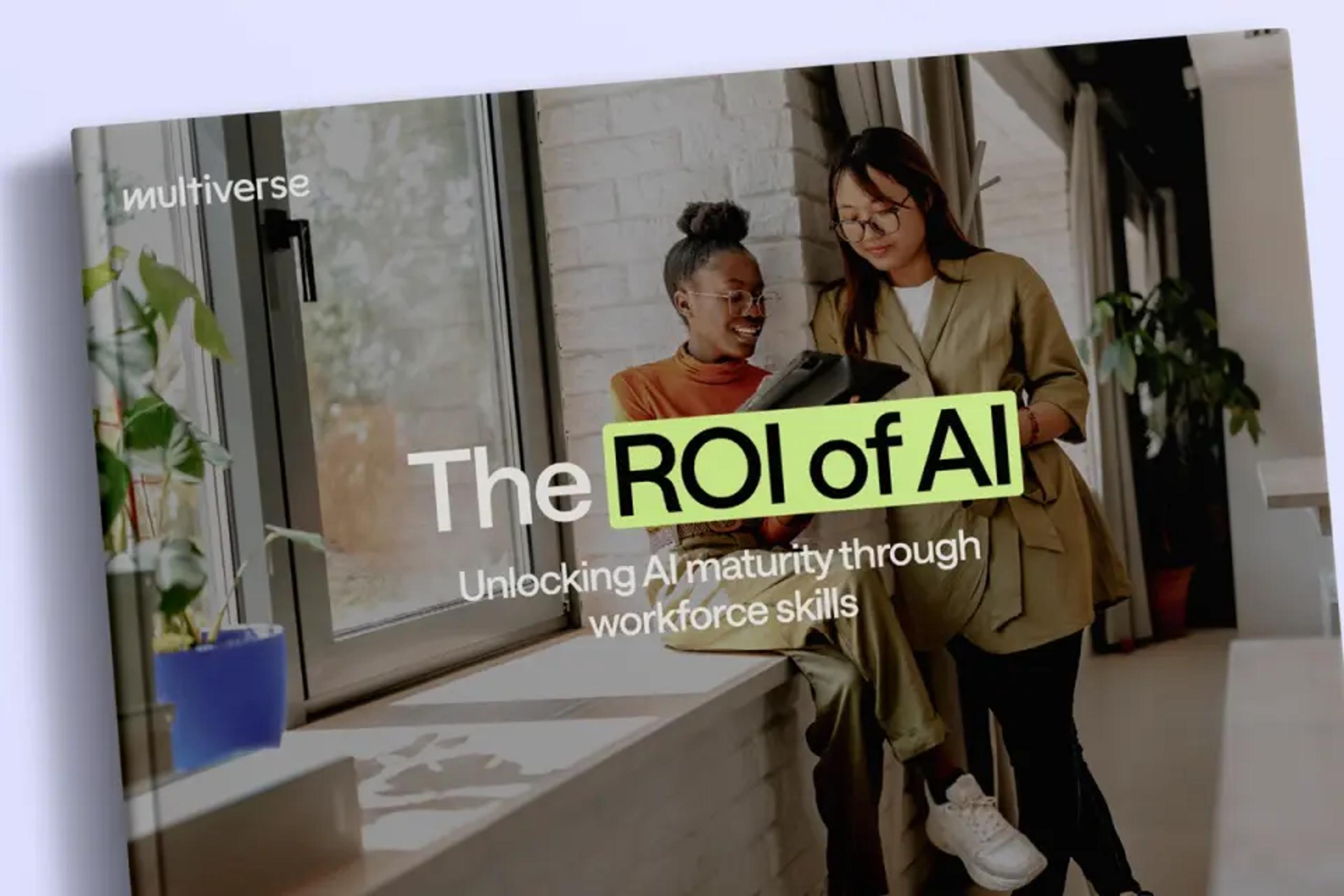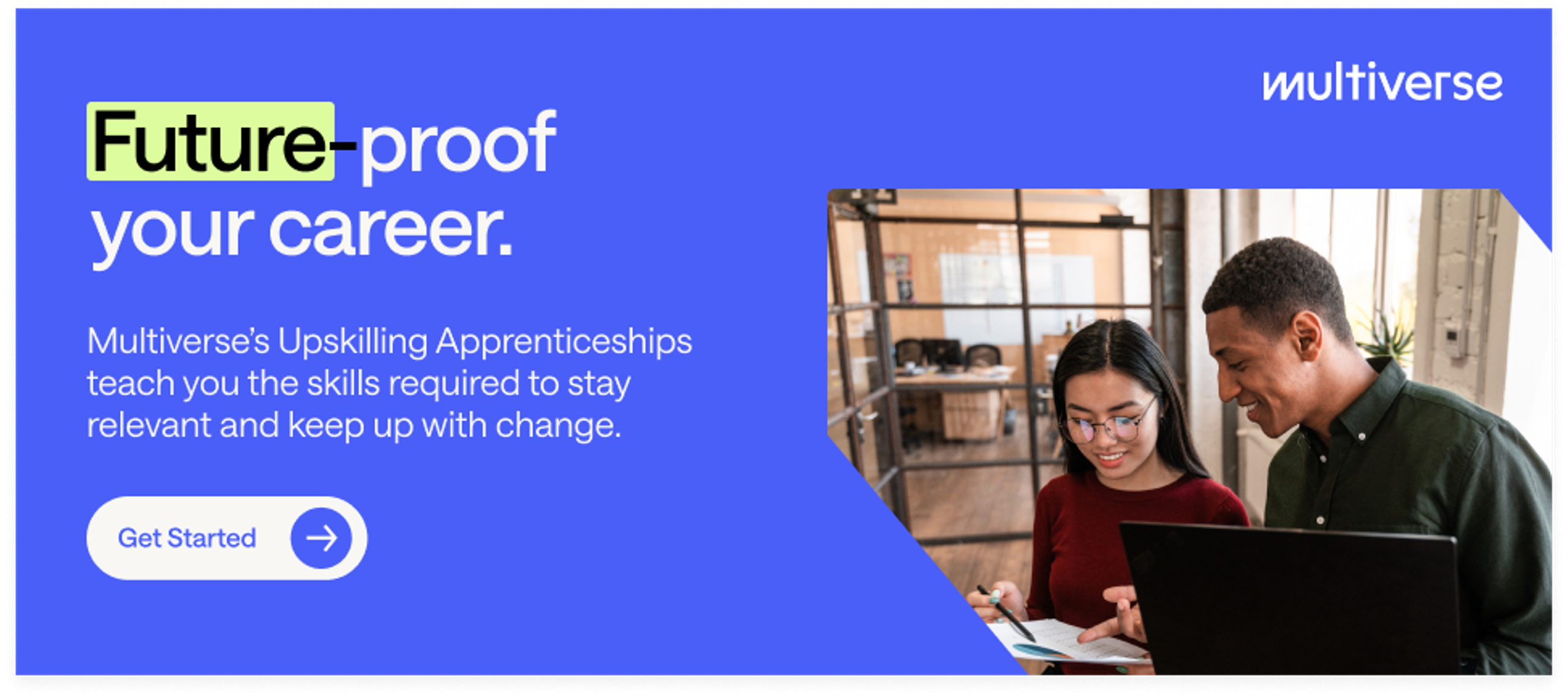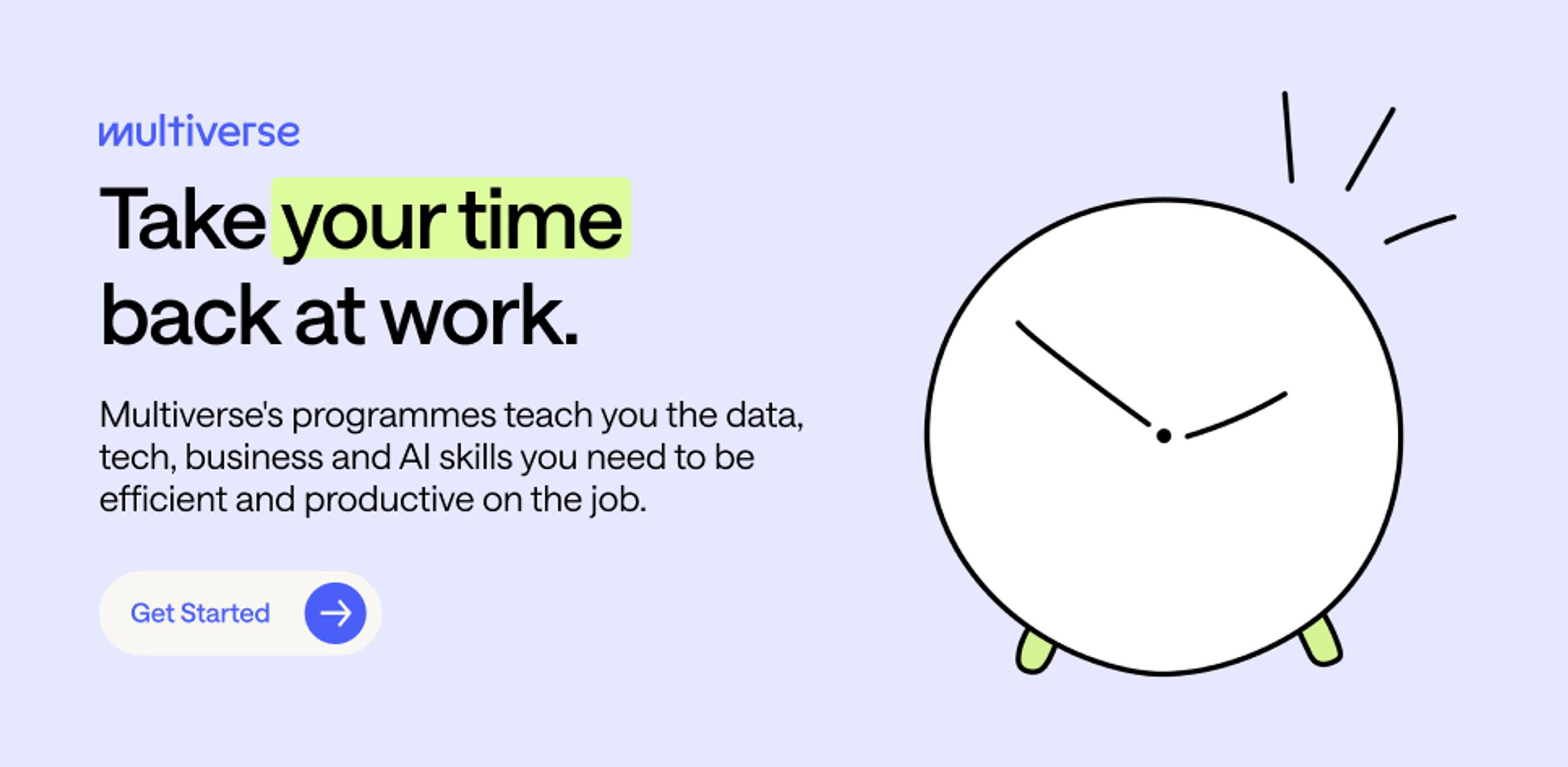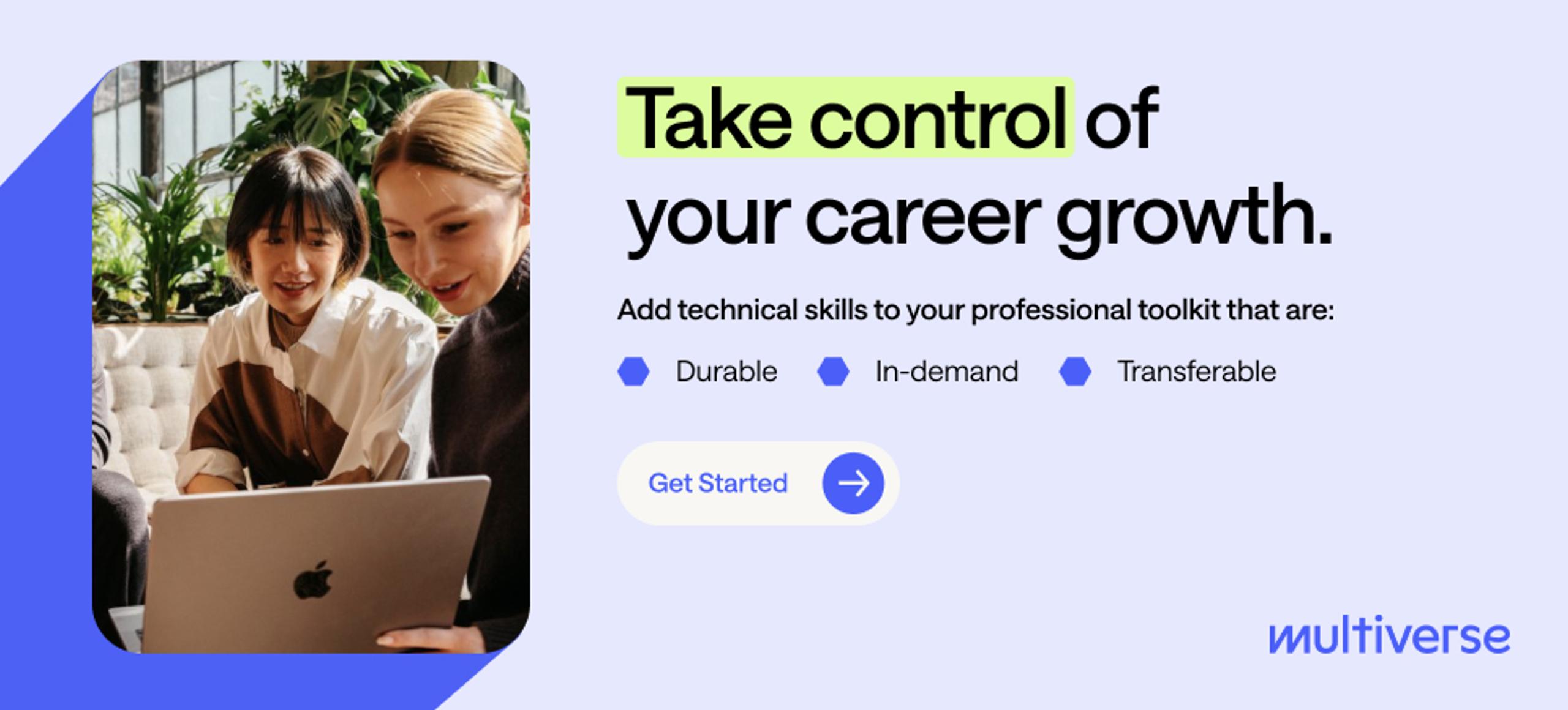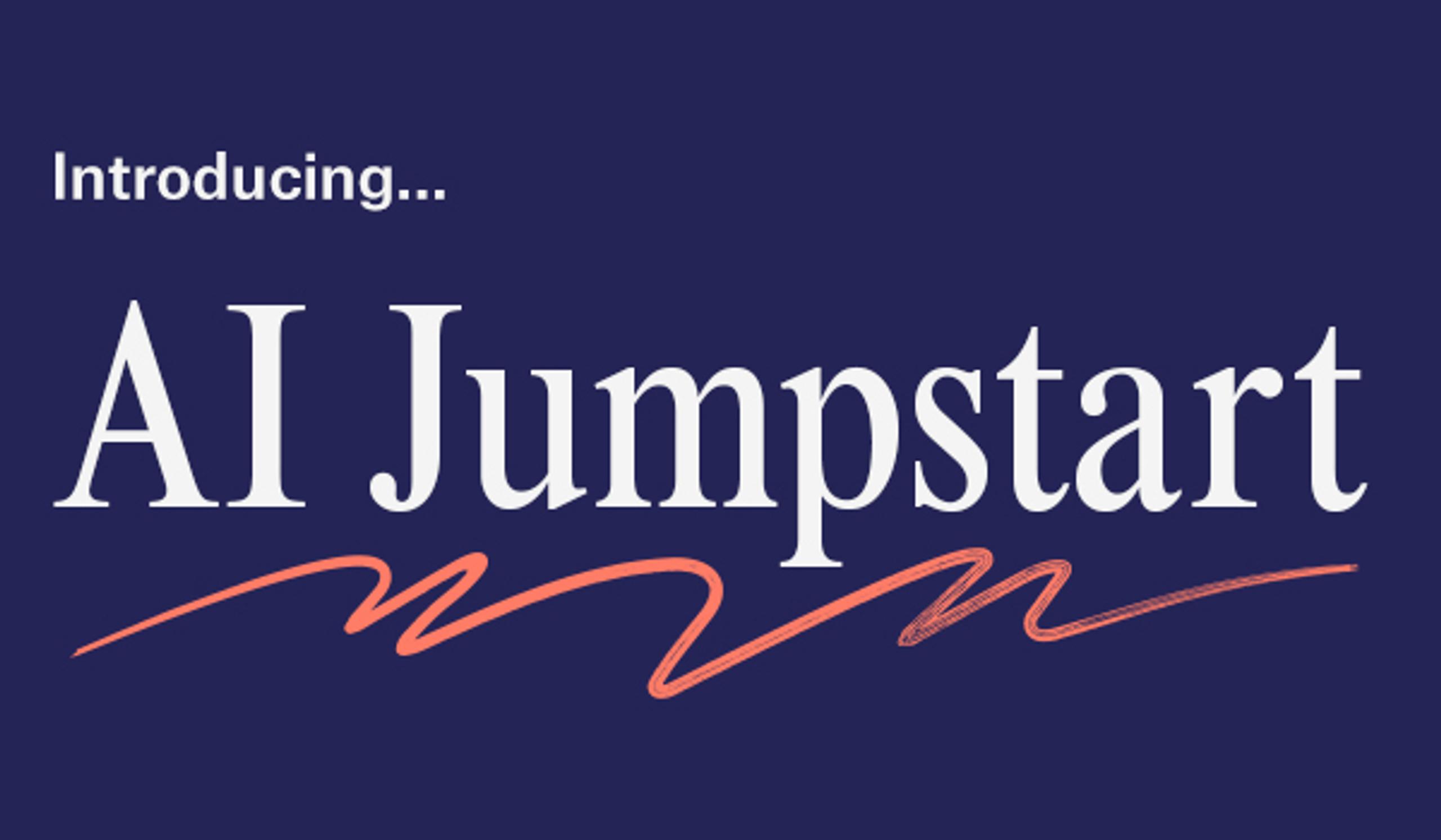The artificial intelligence (AI) revolution is officially here. But it doesn’t look quite like Hollywood or the science fiction writers imagined.
Super-intelligent humanoid robots aren’t roaming the streets (at least, not yet). AI technology, however, is transforming industries and reimagining the way businesses operate. For workers, it’s also an inflection point — one that’s sparking a reevaluation of the skills needed to achieve staying power in a challenging job market. By 2027, an estimated 42% of companies(opens new window) surveyed by the World Economic Forum will prioritise training workers in AI and big data skills.
As AI becomes more integral to everyday operations, businesses need skilled workers to develop, train, and apply this technology. 81% of tech leaders plan to increase their investments in AI over the next three years.
This poses a massive opportunity for forward-thinking professionals to take charge of their career trajectory by learning high-value AI skills. According to a Multiverse report, 56% of surveyed workers at AI-integrated organisations plan to negotiate higher pay in the next 12 months.
Below, we’ll take a deep dive into the crucial AI skills and tools needed to thrive in the AI-enabled job market — both today and tomorrow. We'll also share practical tips and resources for expanding knowledge in these areas.
Understanding the LLM revolution
AI adoption has skyrocketed as organisations race to stay ahead of the competition. According to consulting firm McKinsey & Company, the percentage of businesses using AI tools jumped from 55% in 2023 to 72% in 2024(opens new window). With 50% of organisations already using AI for two or more business functions, it’s clear that this isn’t just a momentary trend; it’s a seismic shift in how we work.
The versatility of AI tools has significantly contributed to their surging popularity. Many businesses rely on this technology to automate repetitive or time-consuming workflows. In the healthcare industry(opens new window), for instance, professionals are using AI to automate document classification, patient indexing, and other data entry tasks. Meanwhile, marketing and sales teams (opens new window)are turning to AI to hyper-personalise content and automatically send follow-up emails to prospects.
Beyond automation, businesses across industries are employing AI to analyse data and make more strategic decisions. For example, Schneider Electric’s Sustainability Business uses AI-assisted forecasting tools(opens new window) to predict extreme weather events. As Schneider Electric Sustainability President Steve Wilhite explains, “These forecasts, partnered with human-expertise, will support everything from energy efficiency and optimisation to emissions reduction to grid resiliency.”
Despite the massive gains, even the most AI-savvy businesses have struggled to unlock the technology’s full potential. Only 27% of business leaders consider their organisations “AI Adept,” which means they’ve embedded AI across their operations to improve strategic decision-making.
“All organisations should strive to be AI native — fully embedding and realising the ROI advantages of AI — in the years ahead,” explains Anna Wang, Head of AI at Multiverse. “However, because of the newness of the technology and the pace of change, many organisations are struggling to get a clear view of their own progress.”
For workers and organisations, understanding the tools and technologies leading the AI revolution — and how to leverage them to drive demonstrable business value — is essential. Below, we’ll highlight three key technologies gaining traction in workplaces in the UK and beyond.
ChatGPT
In November 2022, OpenAI launched ChatGPT, an AI-powered conversational model that quickly became a household name. By August 2024, the company estimated that an astonishing 200 million people were using the tool weekly(opens new window).
ChatGPT is a large language model (LLM) trained on vast amounts of data. Developers create LLMs using neural networks that contain interconnected nodes and layers. These structures learn how to process and transmit data, just like neurons in the human brain.
ChatGPT’s neural networks use natural language processing to understand and respond to human language. The LLM breaks down text into patterns and smaller components, analysing it for meaning and context. It uses this information to generate relevant responses that closely mimic human writing or speech.
The conversational nature of ChatGPT makes it incredibly accessible, contributing to its widespread popularity. According to the ROI of AI report, 61% of workers have picked up new AI skills by experimenting with ChatGPT.
Text-To-Image Generators
Generative AI tools like MidJourney and DALL·E 3 use advanced machine learning techniques to create images from text prompts. Unlike ChatGPT, which is powered by LLMs designed for text generation, these platforms rely on diffusion models or other image-generation architectures. Diffusion models work by adding “noise” (random pixels) to data, such as images, and then gradually removing noise through multiple iterations to generate new images based on the text prompt.
Businesses can use image-to-text generators like Midjourney to generate personalised images in a fraction of the time it takes to create traditional art. This technology also helps professionals brainstorm new content ideas, such as film posters and social media graphics.
London-based ad agency 10 Days is one company that has embraced text-to-image generators. Their creative team uses these tools to design visually complex brand characters, logos, packaging, and picture books.
GitHub Copilot
GitHub Copilot is an AI-powered programming assistant built on an LLM. It allows users to input code snippets and generates suggestions to complete them. The software also answers coding-related questions, detects bugs, translates code into different programming languages, and more.
According to Stack Overflow’s 2024 Developer Survey(opens new window), 44.2% of professional developers use GitHub Copilot for programming tasks. This tool lets professionals write code more quickly and accurately, significantly improving efficiency. A GitHub study found that developers who used Copilot completed coding tasks 55% faster(opens new window) than those who didn’t use this tool.
According to payments startup Pockyt(opens new window) founder Mason Lin, this achievement is only the beginning of a larger digital transformation for the startup.
“We anticipate a 500% increase in productivity in the medium to long term as we continue adapting AI and fine-tuning our software development life cycle,” Lin says.
AI and job growth: The path to a resilient career
As more businesses embrace AI, many professionals are understandably curious about how it will affect their careers. While it may take decades to understand the full impact of these advancements, one thing is certain: AI is fundamentally reshaping the workforce.
By 2030, generative AI and similar technologies may automate up to 30% of current working hours(opens new window). This shift could require up to 12 million Europeans to transition into new roles — twice the pre-pandemic rate.
But it’s not all doom and gloom. AI is unlocking exciting new job opportunities across all sectors. A 2024 Gartner survey revealed that 67% of mature organisations are developing positions related to generative AI(opens new window).
The UK job market already reflects the growing influence of AI. According to a PwC report, AI-related job postings have increased 3.6 times faster(opens new window) than other positions. The report also found that UK employers are willing to pay a 14% wage premium for workers with AI skills — a clear indication of the value of skilled human operations in workplaces increasingly fueled by AI-driven insights.
“Skilled people are crucial to realising the full value of AI,” explains Gary Eimerman, Multiverse’s Chief Learning Officer. “Without a thorough understanding of AI, businesses may be limiting the value derived from the technology in the long-term.”
The UK government has developed several initiatives to support AI skill development. For instance, the Digital Skills Council offers resources to help workers reskill and upskill for digital careers. Additionally, the Secretary of State recently appointed(opens new window) tech entrepreneur Matt Clifford to spearhead the AI Opportunities Action Plan. This project will outline strategies to develop AI talent in the private and public sectors.
Expanding your AI skills now will help you get ahead of the curve and navigate the coming technological disruptions. Upskilling can also prepare you for emerging AI careers, such as:
Digital Transformation Consultant
A Digital Transformation Consultant helps businesses use AI and other technologies to automate workflows and drive innovation. They assess each client’s existing tech stack and develop a strategic plan for integrating new technologies.
Salary data:
- Entry-level: £41K
- Average: £60K
- High earners: up to £74K
Source: Glassdoor
AI Compliance Officer
An AI Compliance Officer oversees their organisation to make sure all employees use AI tools and data ethically and legally. They develop policies for AI usage, educate workers about best practices, and audit AI systems.
Salary data:
- Entry-level: £27K
- Average: £33K
- High earners: up to £50K
Source: Talent.com
Automation Consultant
An Automation Consultant identifies opportunities to develop more efficient and streamlined operations. They use AI software and other tools to automate workflows, from sending appointment reminders to ordering supplies.
Salary data:
- Entry-level: £35K
- Average: £47K
- High earners: up to £63K
Source: Glassdoor
Future-proofing your career: The 5 skills you need to stay relevant in the age of AI
The rapid adoption of AI technologies has led to a nationwide talent shortage. In 2024, 81% of UK IT managers agree(opens new window) that there’s a critical AI skills gap, an increase of 9% from the previous year.
A lack of education and few opportunities for hands-on practice have contributed to this growing skills gap. According to Multiverse data, only 45% of employees received formal training from their employers.
“Workers are fending for themselves, either funding their own AI training or learning through trial and error,” Wang says. As a result, “it is difficult for them to self-assess their own knowledge gaps and learn most efficiently with their limited time.”
Fortunately, there are plenty of resources to help you learn AI concepts and expand your digital toolbox. Here are the most critical skills needed for success in the AI-enabled workplace.
1. Prompt engineering
Prompt engineering involves writing and refining specific inputs to get more accurate and tailored outputs from generative AI tools. According to Multiverse data, only 14% of tech leaders believe their organisation lacks this skill — a testament to the primacy of prompt engineering in the hierarchy of foundational AI skills.
Whether using ChatGPT or other generative text tools, workers can deploy numerous strategies for writing effective AI prompts. These include:
- Providing necessary context, such as your desired tone, industry, and target audience
- Using roleplay prompts, like “Imagine you’re an experienced UX Designer who wants to create user-friendly features for a mobile app”
- Giving the AI a list of “do’s” and “don’ts”
- Inputting an example and ask the AI tool to model its response after it
- Experimenting with different versions of the prompt until you get the desired output
Prompt engineering allows professionals to generate more engaging and precise content. For example, a Data Analyst could use prompt engineering to create a detailed report highlighting actionable insights based on specific findings. Meanwhile, a Software Developer could prompt an AI tool to review code output for a new feature.
Taking an online course in natural language processing can help you learn how to develop better prompts. Experimenting with free tools like OpenAI’s Playground will also sharpen your skills.
2. Data analysis
Employees spend an average of 14.31 hours weekly — over 30% of their time at work — on data tasks. Yet Multiverse survey data found data analytics to be the biggest AI skill gap organisations face, with 52% of tech leaders and workers agreeing their businesses are lacking in this area.
You don't need a degree in data science to learn this skill. Accessible AI-powered tools like Microsoft Power BI and Tableau make collecting, processing, and analysing data easier than ever. They also allow users to create engaging data visualisations and reports.
Let’s say a Marketing Specialist wants to improve their social media campaigns. They could use Tableau to collect engagement data from Instagram and analyse it for trends. For example, they may discover that videos with music consistently perform better than posts with photographs. Based on this insight, they can create similar content to capture their audience’s attention more effectively.
Tableau and Power BI offer many free resources — including tutorials and community forums — to help you strengthen your data analytics skills.
3. Identifying AI workflows and implementing AI-related projects
While there are many useful AI tools, it can be difficult to weave them into your company’s existing workflows. Multiverse data shows 48% of tech leaders think their organisation can’t execute AI projects effectively.
Creating a project roadmap will help you spot opportunities and implement AI tools successfully. This framework should include these steps:
- Assess existing workflows to understand your organisation’s challenges and needs
- Identify areas where AI tools can provide advantages over conventional methods
- Form cross-functional teams that bridge data science, software development, and other departments
- Create clear guidelines for AI usage and data governance
- Rollout AI systems gradually to prevent disruptions
- Establish performance metrics to make sure your project is on the right track
4. Building AI features
Developing AI features is another critical skill gap identified by 26% of tech leaders and workers, according to the Multiverse ROI of AI report. This skill requires a basic understanding of machine learning algorithms and data analytics.
Luckily, you don’t have to start from scratch while creating AI features. Tools like PyTorch and TensorFlow offer libraries and extensions that simplify the process of building and training machine learning models. Software developers can use TensorFlow’s LiteRT library to integrate machine learning models into Android and iOS applications.
You don’t need a software engineering background to contribute to these projects. Low-code platforms like Microsoft Power Apps have intuitive, user-friendly tools that anyone can use to build AI features.
5. Ethics and responsible AI usage
The vast majority (93%) of workers surveyed by Multiverse believe they use AI ethically. But AI technology raises many ethical and legal challenges that aren’t always immediately apparent.
A 2024 study by the University of Essex(opens new window) discovered that AI hiring systems can “create algorithmic bias against women” by filtering applications based on gendered language. Along with bias, data privacy is another significant concern. Notably, Google faced a class-action lawsuit(opens new window) for using patient data from the Royal Free NHS Trust without consent to train its AI models.
AI ethics frameworks can help you navigate tricky situations and adhere to data privacy laws. The UK government has developed ten principles to guide the ethical use of generative AI,(opens new window) prioritising accountability, human control, and transparency. Similarly, the European Union created a human-centric framework for ethical AI usage(opens new window).
Improving AI skills: Challenges and opportunities
Strengthening your AI skills takes effort, time, and the willingness to step outside your comfort zone. Taking advantage of online resources and seeking guidance from mentors will help you navigate the learning curve. Here are three options for levelling up your AI skills.
Completing self-taught courses
Many organisations have developed online courses that let you study artificial intelligence at your own pace. For example, AWS and Coursera offer classes on machine learning, natural language processing, and other AI fundamentals.
These courses are a convenient way to learn foundational AI skills while focusing on the areas most relevant to your professional development. However, they typically don’t offer personalised coaching or opportunities for hands-on practice.
Going back to school full-time
Some upskillers return to university to earn degrees in artificial intelligence, computer science, information technology, and related fields. These programs have structured curricula and may offer experiential learning opportunities like group projects and internships.
But the cost of going back to school can be high. College students in England pay up to £9,250 annually in tuition(opens new window), plus living expenses and other fees. And that’s not factoring in the lost wages from time spent studying instead of working, which can add up quickly over the course of a degree.
Learning on the job
Multiverse’s upskilling programs provide a unique opportunity to learn artificial intelligence skills on the job. We offer 12 to 18-month programs in AI, data analytics, and other tech disciplines — none of which require you to leave your current role to participate in.
Our AI-Powered Productivity program empowers you to use generative AI tools to boost efficiency and output. You’ll learn how to integrate Microsoft 365 Copilot and other cutting-edge platforms in your everyday workflows. The course also covers crucial topics like AI ethics, data privacy, and performance metrics.
The AI for Business Value program focuses on using artificial intelligence to spark innovation and optimise processes across the business. It combines AI fundamentals with business analysis skills, giving you the tools to drive organisational change. Plus, you’ll learn how to communicate the business impact of AI initiatives to non-technical stakeholders.
This modern approach combines the flexibility of online learning with the opportunity to receive personalised feedback from our dedicated instructors.
Unlike university and bootcamp students, you won’t have to pay a hefty tuition bill or reduce your earning potential. Our upskilling programs are funded entirely by your employer, and you’ll keep earning a salary while you learn.
Stay competitive with in-demand AI skills
The AI revolution is already in full swing, and the job market is evolving at lightning speed as employers scramble to keep up. In this competitive environment, upskilling early can help you gain a head start and seize exciting — and potentially lucrative — career opportunities in data analytics, AI consulting, and other areas.
As Anna Wang, Multiverse Head of AI, observes, “It’s time to get employees up to speed on AI to even the data skills playing field and give individuals the opportunity to accelerate their careers.”
Multiverse’s upskilling programs are the only way to gain AI mastery while earning a salary. You’ll study critical AI concepts and start applying your skills in the workplace from day one. Explore our AI for Business Value and AI-Powered Productivity programs for more information, or fill out our quick application(opens new window) to get started today.
